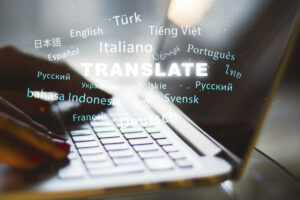The rise of artificial intelligence (AI) has revolutionized many sectors, including legal translation. Thanks to advanced algorithms and machine learning, it is now possible to achieve faster, more accurate translations.
However, when it comes to translating legal documents containing confidential information, compliance with the General Data Protection Regulation (GDPR ) becomes a crucial issue. Legal professionals must ensure that their data remains protected and that no breach of confidentiality can occur.
Lexa, the translator who speaks your legal language, is committed to ensuring data security and confidentiality while complying with regulatory requirements. But what are the risks of using AI for legal translation, and how is Lexa responding to these challenges?
The challenges of RGPD in AI-assisted translation
The RGPD, which came into force in 2018, requires companies to protect the personal data they collect, process and store. In the context of AI-assisted translation, several major risks must be anticipated:
1. Confidentiality of legal documents
Legal documents contain particularly sensitive information, such as :
- Commercial contracts
- Confidentiality agreements
- Company status
- Patents and intellectual property documents
- Judicial decisions
Any leakage or mismanagement of this data can have serious consequences, such as financial penalties, damage to the company's reputation or infringement of customer rights. An AI used for translation must guarantee that these documents remain strictly confidential and are not exploited for other purposes.
2. The opacity of AI algorithms
Artificial intelligences used for legal translation are based on complex models that analyze and interpret language. However, their inner workings can be difficult to understand, particularly in terms of how they process data and make decisions.
The RGPD requires companies to be transparent about the use of personal data. This means that users must be able to understand how their information is being used and ensure that no unauthorized processing is taking place. An RGPD-compliant AI must therefore offer a sufficient level of control and visibility over the data it uses.
3. The risk of unsecured storage
AI-assisted translation platforms often require the translated files to be hosted. If this data is stored on servers outside the European Union, in countries that don't respect the same data protection standards, this can lead to RGPD violations.
4. Non-consensual use of data for model training
Some AI solutions use processed documents to improve their linguistic performance via continuous learning. However, the RGPD requires explicit consent before any re-use of personal data. Without this consent, it is strictly forbidden to exploit this information to train an AI model.
Lexa solutions for compliance and data protection
Aware of these challenges, Lexa incorporates advanced security mechanisms to ensure reliable, RGPD-compliant legal translation. Here are the main measures implemented:
1. Advanced data encryption
To protect files sent and translated, the tool uses end-to-end encryption. This means that documents are encrypted before being sent to the platform, and can only be decrypted once they have been returned to the user.
2. An RGPD-compliant hosting infrastructure
All files processed by Lexa are stored exclusively on secure servers located in the European Union. These servers meet the most stringent standards in terms of cybersecurity and data protection.
3. A strict policy of non-reuse of data
Unlike other Artificial Intelligence solutions, we guarantee that the documents you send us are never reused to train your model. Each translation is processed separately and securely, without any data being retained after the service.
4. Full transparency on data processing
Lexa gives users total control over their data. No information is used for commercial purposes, and companies can request immediate deletion of their documents after translation.
5. Restricted access and strict control
Only authorized users can access the translations via reinforced authentication. What's more, all operations carried out on the platform are logged to guarantee full traceability of the actions performed.
Why choose Lexa for RGPD-compliant legal translations?
With Lexa, legal professionals benefit from an AI translation solution that combines accuracy, security and compliance. By choosing a platform specifically designed to meet the requirements of the legal sector, companies can avoid confidentiality risks while benefiting from the speed and efficiency of AI.
✅ Full RGPD compliance
✅ Secure hosting in Europe
✅ Advanced data encryption
✅ Document non-reuse
✅ Transparency and user control
Thanks to these measures, Lexa is positioned as the ideal solution for lawyers, jurists and companies wishing to benefit from AI-assisted translation while guaranteeing confidentiality and data protection.
Discover Lexa and secure your legal translations today: Lexamt.com




